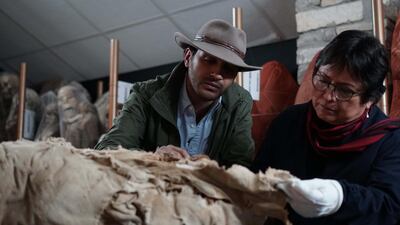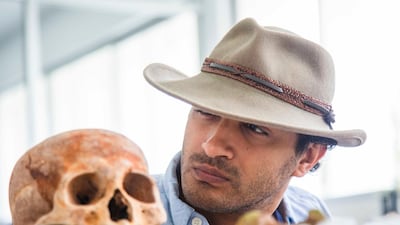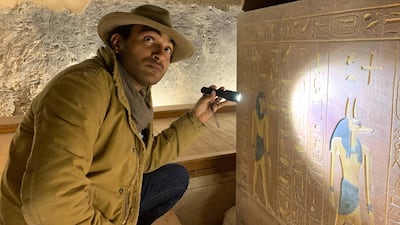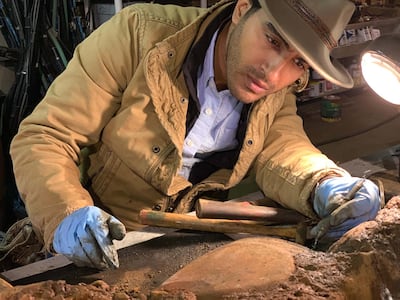Ramy Romany will need little introduction to fans of all things Ancient Egyptian. The Egyptologist, filmmaker and presenter has unravelled the mysteries of the Sphinx, Tutankhamun's curse and religion in Ancient Egypt in shows broadcast on the Discovery and History Channels.
He sticks with his favourite subject for Mummies Unwrapped, which had its premiere on Tuesday night on Discovery. The bandaged bodies certainly continue to have a place in popular culture, featuring in myriad movies, art and folklore. As a man whose interest in mummies goes further than most, The National asks Romany why he thinks people continue to be fascinated by them.
The discovery of Tutankhamun
"It all goes back to one day in the 1900s, a day that changed history forever, when Howard Carter and Lord Carnarvon discovered King Tut's tomb in Egypt," he says. "That struck a whole movement of mummy-mania all across the world, especially in the US where all these movies started happening and people simply loved them."
He says the downside of the craze was that people in the West immediately made assumptions that were not accurate. "It is the reason why a lot of people think that mummies are toilet-paper-wrapped zombies when they come out of the caves," Romany says with a laugh. "There was a huge industry at the time where people were so interested in mummies that they bought them from Egypt and then from all over the world. They would have mummy-unwrapping parties and the aristocrats here would bring mummies and invite their friends and they would unwrap them together."
The obsession didn't stop at unveiling the bodies, either, Romany says. "Some of them believed that those mummies had medicinal values and they would grind them and eat them during that party," he says. "People are very strange sometimes."
The mummy's curse
The ancient corpses are frequently associated with the mystical and the magical, but it's more common to find negative associations, such as the mummy's curse, which is particularly associated with the fate of people involved on the team that opened Tutankhamun's tomb.
Lord Carnarvon died in 1923, five months after the tomb was opened, and another seven members of the archaeological team who were present when it opened died within 12 years of the event. Even Carter's pet canary was eaten by a cobra – the symbol of Egyptian royalty – that got into his house.
As an expert on Ancient Egypt and its mummies, what does Romany make of such stories of ancient hexes? "The mummy curse has always been in the minds of people; the reason is because the Ancient Egyptians made sure, and other ancient civilisations made sure, too, that they at least made people believe there is a curse of the mummies," he says. "In Ancient Egyptian tombs today, there are four blocks placed on the four cardinal sides, called the magical blocks, and you read the inscriptions on them in hieroglyphics. And they say, 'If you come anywhere close to this mummy, you will be choked to death.' And that's why people believe the mummy curse exists."
While Romany doesn't dismiss the idea of the curse entirely, he says that any deaths or illnesses that afflict an archaeological team after a tomb is opened may have a more prosaic explanation than sorcery.
He says that the Ancient Egyptians' mastery of chemistry could have been the key to protecting their dead. "They knew how to deal with chemistry and I wouldn't be surprised if they made sure to use chemistry so that anyone who comes into that tomb gets choked to death," he says. "We've seen so many examples of people not surviving much longer after they open a new tomb or they enter a new tomb. So there could be something to the curse of the mummies. Basically, don't go into tombs – don't risk it.

"Some people would call this magic, some people would call this superstition, and whether the mummy curse exists or not nobody really knows," he continues. "But what I can tell you as a scientist and a sceptic is that Ancient Egyptians were marvellous chemists and great biologists. They managed to preserve ancient bodies for thousands and thousands of years. And if we didn't know how they did it, or we didn't know their technology, we'd have called it magic today."
Mummies in the modern world
Romany has written, produced, directed or starred in more than 100 documentaries on Ancient Egypt to date, with mummies a recurring theme in those shows.
With so many similar shows of his own out there, as well as the plethora of alternatives that appear on TV schedules across the world, how does he keep his show fresh, and what separates it from the competition?
"Today, unlike any other time in our history, we have amazing modern technology," he says. "It might sound shocking, but with a little hair sample of any of these 3,000-year-old mummies, we can tell what the diet of that person was when he died and what exactly the last meal they ate was before they died.
"The technology we have today can allow us to talk to these mummies and that's what I try to use in every episode of Mummies Unwrapped."
Romany has one other way to ensure his new show will stand out from the crowd: his unique approach to the subject matter. "People associate mummies with Ancient Egypt all the time, and most people don't know that they are not only found in Egypt; they are all over the world," he explains.
"In this season of Mummies Unwrapped, we go all over the world to uncover mummies and solve mysteries. I believe that the secrets to all the mysteries of the past lie within the dead and that's how I approach it – like a crime scene investigation, like a full-on murder mystery. Instead of looking at mummies as weird superstitious creatures, I really look at them as dead people. And I try to uncover their stories."
Mummies Unwrapped is broadcast on Tuesdays at 10.50pm on the Discovery Channel, www.discovery.com



